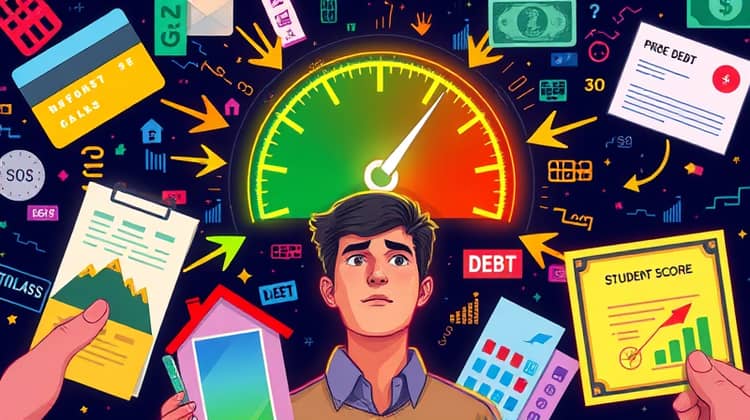Debt and Your Credit Score: How It's Affected and What You Can Do

Debt and credit scores are two interconnected aspects of personal finance that can greatly influence one another. Understanding how different types of debt affect your credit score is essential for managing your finances effectively. In this article, we will explore the relationship between debt and credit scores, the various kinds of debt, and actionable steps you can take to manage your debts and improve your credit standing.
Understanding Credit Scores

Credit scores are numerical representations of your creditworthiness, calculated based on your financial history. Lenders use these scores to assess the risk of lending money or extending credit to an individual. A higher credit score indicates better creditworthiness, which can lead to favorable terms on loans and credit cards.
Having a good understanding of what affects your credit score can empower you to make better financial decisions. Several factors contribute to your credit score, including payment history, credit utilization, length of credit history, types of credit in use, and new credit inquiries.
- Payment history: Timely payments can improve your score, while missed payments can significantly lower it.
- Credit utilization: Keeping your credit card balances low relative to your credit limit can help raise your score.
- Credit history length: A longer credit history is often seen as more favorable.
- Types of credit: A mix of credit types, such as revolving credit (credit cards) and installment loans (car loans), can also influence your score.
- New credit inquiries: Applying for too much new credit at once can ding your score temporarily.
Knowing these factors allows you to take proactive steps to maintain or improve your credit score, which can mitigate the negative impact of debt.
The Relationship Between Debt and Credit Scores

Debt plays a crucial role in determining your credit score. When you take on debt, whether it's through loans or credit cards, how you manage that debt will reflect on your credit report and influence your credit score significantly.
For example, consistently making on-time payments can enhance your credit profile, while accumulating debt without making regular payments can lead to a decline in your score.
- Monitor your credit regularly to stay aware of changes and any potential mistakes in your report.
- Pay off outstanding debts as quickly as possible to minimize interest charges and improve your overall credit utilization ratio.
- Avoid accumulating excessive debt; it's ideal to keep your credit utilization ratio below 30% of your total credit limit.
Ultimately, managing your debt responsibly is key to maintaining a healthy credit score and securing better financial opportunities in the future.
Types of Debt and Their Impact on Credit Scores

Different types of debt can have varying effects on your credit score. Understanding these differences is essential for effective credit management. Each kind of debt influences your score in unique ways, based on factors such as payment history and utilization rates.
1. Credit Card Debt
Credit card debt is often the most common type of debt individuals carry. Late payments or high balances can drastically affect your credit score, as credit utilization considers the ratio of your current balance to your total credit limit.
For example, if you have a $10,000 limit and $3,000 in debt, your utilization rate is 30%. Keeping this below 30% is crucial for your credit health.
- Pay your bills on time to avoid penalties and negative impacts on your score.
- Keep your balances low relative to your credit limit to maintain a favorable utilization ratio.
- Consider making multiple payments throughout the month to keep your balance low.
By managing credit card debt wisely, you can positively impact your credit score over time.
2. Student Loans
Student loans can also influence your credit score, particularly if you manage them responsibly. On-time payments can contribute positively, while missed or late payments can have the opposite effect.
Furthermore, federal student loans often have more flexible repayment options than private loans, allowing borrowers to adjust their payments based on income.
- Consider consolidating or refinancing your student loans to reduce payments.
- Stay informed about your repayment status to avoid defaults.
- Use deferment or forbearance options responsibly to maintain your credit score.
By being proactive with your student loans, you can enhance your credit standing while managing your debt effectively.
3. Mortgages
Mortgages are generally seen as a positive debt, provided you keep up with the payments. A mortgage demonstrates your ability to manage long-term debt, which can positively affect your credit score.
However, defaulting on mortgage payments can severely impact your credit score and financial stability, making it essential to keep up with payments.
- Continuous, on-time mortgage payments can build a solid credit history.
- Refinancing might lower your payment but can also add fees or extend the loan term, impacting your credit.
- Avoid taking on additional debt while managing mortgage payments to keep your credit score stable.
Managing your mortgage carefully can reflect positively in your credit history.
4. Personal Loans
Personal loans are unsecured loans that may carry higher interest rates than secured loans. They can be used to consolidate debt or fund expenses. Making timely payments can reflect positively on your credit score.
However, defaulting on a personal loan can have significant adverse effects, just like other debts.
- Review your loan terms carefully to understand repayment schedules and interest rates.
- Make note of due dates and consider setting reminders to avoid late payments.
- Using personal loans responsibly can help you manage other debts and improve your credit score.
Hence, personal loans can be a useful tool when managing your finances properly.
5. Auto Loans
Auto loans, like mortgages, can also lend positive weight to your credit report provided they are managed well. These loans typically require regular monthly payments, making it essential to remain current on them.
Even a single late payment can significantly affect your credit score, so keeping track of your payment schedule is crucial.
- Choose the right loan structure to avoid overextending your budget.
- Consider opting for lower monthly payments by extending the loan period, but be cautious of total interest paid over time.
- Automate payments to ensure they are always made on time.
Being responsible about auto loans can contribute positively to your overall credit health.
How to Monitor Your Credit Score

To maintain a healthy credit score, it's vital to monitor it regularly. There are various services that allow individuals to check their scores for free, which can provide crucial insights into how your financial behaviors impact credit health.
Being proactive about checking your score enables you to catch discrepancies or drops in your score quickly, allowing for timely corrections or adjustments to your behavior.
Additionally, monitoring your credit report frequently can help identify areas for improvement and set benchmarks for financial goals.
Tips for Managing Debt to Protect Your Credit Score

Effective debt management is essential to protecting and even enhancing your credit score. By being strategic in how you handle debts, you can minimize their impact on your credit history.
It's crucial to adopt sound financial practices to prevent debt from negatively affecting your credit score.
- Establish a monthly budget to track spending and allocate funds towards debt repayment properly.
- Prioritize high-interest debt first to minimize interest payments over time.
- Consider a debt snowball method, where you pay off smaller debts first, helping to build momentum and motivation.
By effectively employing these strategies, you're more likely to keep your credit score intact while managing existing debts.
When to Seek Professional Help

If you find yourself overwhelmed with debt or unable to keep track of your payments, it may be time to seek professional assistance. Credit counseling services can help you better understand your financial situation and suggest strategies for debt management.
Additionally, if you're in danger of defaulting on loans, talking to a financial advisor can help you explore options for debt relief or restructuring. If you're seriously considering filing for bankruptcy, it’s essential to have professional guidance to understand the consequences and the process involved.
A professional can provide personalized solutions based on your financial health, helping you set realistic goals to get back on track.
Taking action before a financial crisis escalates can save you from worsening your credit score and financial future.
Conclusion

Managing debt effectively is critical to maintaining a healthy credit score, which plays a crucial role in your overall financial health. Being mindful of how different types of debt impact your credit history can guide your financial decisions and spending habits, empowering you to navigate your personal finances better.
In summary, understanding the relationship between debt and credit scores, monitoring your credit regularly, and employing practical debt management techniques can help you cultivate both a good credit score and a stable financial future.






